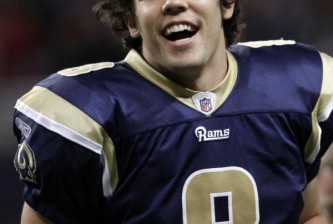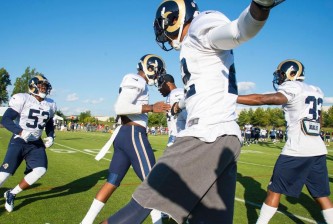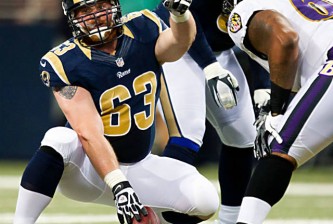Shahid Khan rode into our Camelot on his white horse, appearing from the east this winter with the frigid Illinois sun at his back, carrying a promise to save the Rams from the evil clutches of those desperate and callous Southern Californians. But as he prepared his siege tower to mount the mighty castle walls of the NFL owners’ club, he watched, appalled, as another knight strode casually across the drawbridge, bearing the Kroenke family crest.
Now Sir Khan the Pure must sit on his horse and wait as Sir Kroenke the Implacable, his lady and his team of legal squires parry and joust on a paper battlefield, trying to find an honorable way to skirt the rules of play without offending the almighty King Goodell. Any attempt at this point to continue his honorable quest for the holy grail of NFL ownership will be met with jeers and insults.
http://youtube.com/watch?v=R7qxqvjTbu0
Corny, isn’t it? But in the absence of anything else to talk about, this is the storyline that has emerged around the Rams’ still-unsettled ownership situation. Witness the P-D pundits’ recent roundtable and poll results on the subject, and the editorial stance of articles such as this from the RFT:
— Aaron Schafer, RFT Breaking Down the Kroenke Kaper
Khan is the warm-hearted fan who, like us, is stuck on the outside. Kroenke is the cold-blooded shark who can’t be trusted. But is this fair to Kroenke? Why shouldn’t he be the hero of this story? Is he not every bit as much as Khan in position to “save” the Rams?
A history of instability
The Rams haven’t known good ownership in a long time. We suffered for years under the absentee ownership of Georgia Frontiere, as she placed her faith in a series of so-called football men who seemed more interested in their own petty battles for placement in Georgia’s inner circle, than in making sound football decisions. Whether Kroenke or Khan, we will see the second ownership change in three years, a restlessness almost unheard of for most franchises, but sadly, just part of a long tradition in Rams’ history.
The P-D’s new interactive timeline of the Rams lists multiple changes in team ownership over the last sixty years, involving twenty two different people, including Bob Hope, Gene Autry, and famed racehorse owner Robert Lehman. Most were minority partners during the financially chaotic tenure of Daniel Reeves, who was the principal owner from 1941 until his death in 1971. Then in 1972, Robert Irsay purchased the team and owned it for a hot minute before trading franchises with Carroll Rosenbloom, who owned the Baltimore Colts. Three ownership changes in less than a year. Then, of course, Rosenbloom passed and left the team to Georgia.
 If the team has shown signs of dysfunction and lack of organization over the years, just consider this history. The team never really had a blueprint for success, but a confluence of incredible luck led to a magical 1999 season and a first-ever football championship for the city of St Louis. Consider, with the soft eyes of the backwards-looking glass, the “master strokes” that formed the foundation of the team:
If the team has shown signs of dysfunction and lack of organization over the years, just consider this history. The team never really had a blueprint for success, but a confluence of incredible luck led to a magical 1999 season and a first-ever football championship for the city of St Louis. Consider, with the soft eyes of the backwards-looking glass, the “master strokes” that formed the foundation of the team:
- Signing a too-emotional former burnout at head coach, who alternated between brutally punishing workouts and tearful news conferences, then retaining him after two awful seasons.
- Recruiting a brash offensive coordinator who had never run an offense above the collegiate level, and never had even a bowl game apearance on his resume.
- Trading for a disgruntled running back coming off a major injury and known as much for his reputation as a “clubhouse cancer” as for his talent.
- Starting a quarterback who had been lifted off the Iowa Barnstormers of the AFL, and who had spent his summers bagging groceries to pay the rent.
This isn’t the kind of planning that usually pans out. But as we all know, that 1999 year became the year of the Ram, and set the table for NFL underdogs of all kinds to follow. (Witness the first-ever championships for the Bucs, Ravens and Saints, and the transformation of the Patriots from doormat to dynasty. All thanks to the Rams.)
Pushing Reset
Georgia Frontiere’s death just after the end of the 2007 season was respectfully mourned by all involved with the team, but once the period of mourning was over, a period of serious evaluation begun, led primarily by her son Chip Rosenbloom. To assist with the process, Chip brought in Billy Devaney from outside the organization, and gave him a central position to evaluate the talent in the locker room, and the inner workings of the football organization.
Together, Devaney and Rosenbloom have led a massive organizational turnaround.
From the Rams’ 53-man roster that year, only nine* are under contract now (not counting Atogwe or Little, both of whose future with the Rams is uncertain). Of those nine, only Steven Jackson is a starter on offense.
In the front office, the change has been just as drastic, as the coaching staff and much of the internal organization has been completely turned over. The reset button has been pushed, and now we await the announcement of who will sit at the head of the Rams’ table.
Ready for a turnaround
Shahid Khan built his business from the ground up, starting with a small business loan and a few thousand dollars of savings, eventually buying his former employer and building an auto parts empire. He has lived in Southern Illinois for most of his adult life, and is a long-term Rams fan. Clearly, there’s a lot of appeal in having a fan in the front office that is committed to the area. But there are downsides, too.
Khan’s somewhat murky tax situation with the government puts a big question mark on his ability to carry (or finance) the long term commitment of maintaining a competitive franchise. A lot of fans have to make sacrifices when times get tight, but would we be so understanding if it was the man in the top chair letting top players walk?
There is also the question of whether the owner-fan makes for a good manager. Mark Cuban is deeply, emotionally invested in his team. So is George Steinbrenner, and so is Al Davis. All three have nearly limitless resources at their disposal, but they also have drastically different ways of running their teams. The one commonality? Each has been known to make rash decisions that aren’t always in the long-term benefit of their team.
Kroenke, meanwhile, has none of the financial question marks that Khan has, and has been an exemplary owner of the NBA’s Nuggets and NHL’s Avalanche. The Avs are more comparable to the Rams, as they won the Stanley Cup in 2001 and stayed in contention for years after with an aging core, but had to rebuild nearly from scratch following the strike year in 2007. This year, they found themselves back in the playoffs, and appear to be on the way back up. While Kroenke may be cast as a ruthless businessman, that hasn’t inhibited his ability to build steady franchises that keep fans engaged, nor has it stopped him from investing further millions of dollars in stadium improvements and other local investments.
For what it’s worth, Mayor Slay appears to agree.
As I’ve argued before, both the Rams and St Louis represent a significant investment opportunity, and I believe the reasons to keep the team here are manifest, even as the 2015 “opt-out” date looms.
In other words, let’s not worry about who’s a bigger fan, and perhaps worry instead about whose ownership bid represents the best long-term option for keeping the Rams competitive.
* corrected… my original count was eight.






















